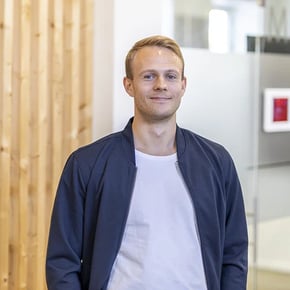Imagine you are taking a business trip to one of your company’s offices. The office is located far away from your own location, so you would pre-book a hotel to rest. You choose a hotel by viewing the price, quality, and other requirements to support your needs. You plan to stay there for a few days until you will be on your way again. This is the same principle with desk hoteling.
Just like a hotel booking, desk hoteling is when you turn your office facilities into bookable resources, that your employees can book in advance. Thereby, ensuring that your employees are guaranteed optimal working conditions, that your teams have an overview of who is in the office, while simultaneously making sure employees are having a pleasant experience when they are in the office.
Desk hoteling is used as a tool to create a hybrid work environment. In this article, we will look at why companies are opting in for Desk hoteling instead of Hot desking.
What is hot desking and desk hoteling?
Desk hoteling is the pre-booking of office desks based on defined criteria. This allows employees to have the freedom to pick their desks at certain time intervals, just like if you would book a hotel - allowing employees to adopt a hybrid work style. Each organization might have its own pre-defined criteria for employees to book desks such as Quiet desks, desks with a view, video-conference desks, etc.
Example of desk hoteling:
John the salesperson is looking for a quiet desk, where he can focus on an important upcoming deadline. His week is filled with external meetings, but there is a gap Wednesday from 10 am to 2 pm. John works best in the office, and he likes the food on Wednesdays. So, he searches for available quiet desks at offices near to his home. He finds three available locations and chooses the desk, which has the best view and is a short distance from his home. John can now rest assured that he has an available working station on Wednesday.
Hot desking is the on-site booking of office desks based upon availability. Employees can go directly into their offices, choose a suitable desk, and book the desk from their phone or computer. This provides extreme flexibility because people can claim space directly on the go. This ties in with companies wanting to do activity-based work.
Example of hot desking:
Margaret the marketing assistant comes into the office at about 8 am. Her day will focus on enhancing collaboration between marketing and sales, so she walks in and tries to find a desk close to the sales team. She finds an unoccupied desk and books it from her smartphone – letting her team know, where she is working.
Why are companies choosing desk hoteling?
Companies opt-in for desk hoteling because it gives employees the freedom to choose their own working station in advance. Just like if you would book a hotel room, people can set their own time intervals and search for desks in various locations including attributes such as a beautiful view and electronic equipment available. This ensures that employees are not coming into the office wasting time searching for desks and figuring out last minute, that their preferred working station is occupied.
Why hot desking is not so hot anymore according to CEO and founder Allan Mørch, AskCody
Speaking to our clients and overseeing the market of meeting management, we believe that companies are opting in for desk hoteling instead of hot desking. In a recent talk with Founder and CEO Allan Mørch, he explained it this way:
“So, the trend we see is that hot desking is not so hot anymore. We are focusing on desk hoteling instead. So of course, hot desking or activity-based work has been around for decades, and a ton of companies were switching into that to provide extreme flexibility.”
There are many reasons, why companies are turning away from hot desking and focusing on desk hoteling instead. One of the reasons is the change in mindset after social restriction became the norm. He continues:
“But now that the COVID social restrictions and work from home have come around, people are requiring that they can book a desk before coming into the workplace. So, they need to have this kind of concierge service, a very centralized way of claiming space before just grabbing it. This means, that bookings are required. Checking in is required. Checking out is required. We need a standardized structure around actually using workplace, not just across desks, but also rooms.”
In other words, it is our understanding that companies need clear procedures of how they are using the workplace. This means that employees have to check-in in advance to use facilities. This gives employees a guaranteed working space, but it also limits the flexibility of the workers.
Desk hoteling – creating a standardized way of booking desks
The risk of choosing a desk hoteling solution is, that the administrative responsibilities become a friction and takes time away from other activities. Therefore, you need to have a simple and standardized method for doing desk hoteling. This may include:
- A system that manages reservations, check desk availability and search criteria
- A reservation confirmation to inform the worker of the booking
- Updating occupancy status – so other team members are informed
- Notifications to remind the employee of the booking
- A check-in option to avoid ghost bookings
- A check-out option
Easy to scale your desk hoteling solution
If you create a well-standardized model, it is easy to scale. If we look at hotel bookings, your process isn’t different if there are 10 or 200 hotels in your area. It does not matter how long you will stay; your booking process always consists of:
- Reservation
- Confirmation
- Check-in
- Check-out
This needs to apply to desk hoteling as well. If your employees follow the same standardized model of booking desks it does not have an influence if you have 40 or 400 desks. It is important that your employees always follow the standardized way of doing desk hoteling, this is the only way to make it work well.
Remind people to book and get data on office utilization
Another great point to why companies are opting in for desk hoteling is to gain data on office utilization. In the scenario of hot desking people are less motivated to book a desk because it is visible for all employees that they are occupying the space with their own presence, their bag and computer. But if you must book a space in advance to secure your workstation, employees are encouraged to book it into their calendars.
This provides data to your organization about office utilization making the job of facility managers easier because they can compare insights across offices. This could be insights on, which types of desks or rooms are being booked and used the most. Does the company have too many desks and meeting rooms or too few. This data can be used to optimize your office facilities, and thereby creating a better work experience for all employees.
Conclusion
In conclusion, desk hoteling is a method of booking office desks based on defined criteria, which provides employees with the freedom to pick their desks in advance. Desk hoteling is used as a tool to create a hybrid work environment, and it has become popular due to the change in the mindset of employees after social restrictions became the norm. Desk hoteling creates a standardized way of booking desks and simplifies the process by providing a reservation confirmation, updating occupancy status, and sending notifications to remind the employee of the booking. This method can be easily scaled by following a standardized model of booking desks. Companies are choosing desk hoteling over hot desking because it gives employees a guaranteed working space while providing them with the freedom to choose their own working station in advance.



